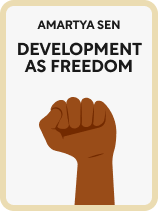

This article is an excerpt from the Shortform book guide to "Development as Freedom" by Amartya Sen. Shortform has the world's best summaries and analyses of books you should be reading.
Like this article? Sign up for a free trial here .
What are market limitations? Is a free market a perfect solution for a failing economy?
A free market has many advantages: individual choice, innovation, and economic growth. However, there are many disadvantages as well, such as an inequitable distribution of wealth and the neglect of public goods.
Let’s take a deeper look into market limitations, explained by Amartya Sen in Development as Freedom.
The Limitations of Markets
Sen advocates a return to a freedom-focused understanding of markets, rather than a strictly utilitarian one. However, he believes that achieving this requires government intervention because of several market limitations.
Specifically, he focuses on unequal opportunities and the issue of “public goods,” both of which inhibit development, if the government fails to intervene.
Unequal Opportunities
While praising the efficiency of markets, Sen also expresses concerns about the distribution of opportunities. Sen explains that everyone doesn’t have the same freedoms or the same ability to make use of them.
Sen makes a distinction between income-earning ability and income-using ability. For example, some people (such as those with disabilities) have more difficulty converting income into well-being.
For example, if a blind man earns the same income as his seeing neighbor, the blind man’s income likely won’t go as far, since he has to incur extra expenses to accommodate his disability. This results in a practical disadvantage that both the income approach and the market ignore.
Additionally, while a seeing person has the freedom to choose between driving a car or taking public transportation, for example, the blind person is deprived of this choice. This limits opportunities, potentially skewing the relationship between income and welfare.
(Shortform note: Organizations like the Inclusive Policy Center share Sen’s concerns about the effect of disability on income, arguing that disabilities put people at a unique economic disadvantage. Some researchers believe the cost of disability amounts to about one-third of income.)
Neglected “Public Goods”
Another market limitation is that free markets neglect “public goods.” Sen believes that government intervention is the proper way to address this market shortcoming. Environmental protection and public health are two prime examples of public goods the market neglects. When the air is polluted, everyone pays the price—not just the person whose actions led to the pollution. Sen believes that the government has a role to play in rectifying these “market failures.” A carbon tax, for instance, could address air pollution by imposing a price on carbon that equals its social cost to the environment.
Public Goods Have Both Individual and Collective Benefits
Public goods in economics refer to products or services that are consumed collectively rather than individually. For example, military defense spending is a public good because one person’s “share” of defense doesn’t leave less defense for others and because a person who doesn’t pay for their share can’t be deprived of the benefits of defense.
Public goods usually have social costs or benefits not included in their market price, thus obscuring their true costs and benefits.
Education is also a “semi-public good.” Even though the primary beneficiary of education is the person being educated, there are social benefits as well. Countries in North America, Europe, and East Asia have all benefited by adopting public education programs even before widespread affluence, which Sen considers a productive use of government.

———End of Preview———
Like what you just read? Read the rest of the world's best book summary and analysis of Amartya Sen's "Development as Freedom" at Shortform .
Here's what you'll find in our full Development as Freedom summary :
- The five types of freedom that are integral to economic development
- How democracy can prevent famine
- How empowering women helps communities






